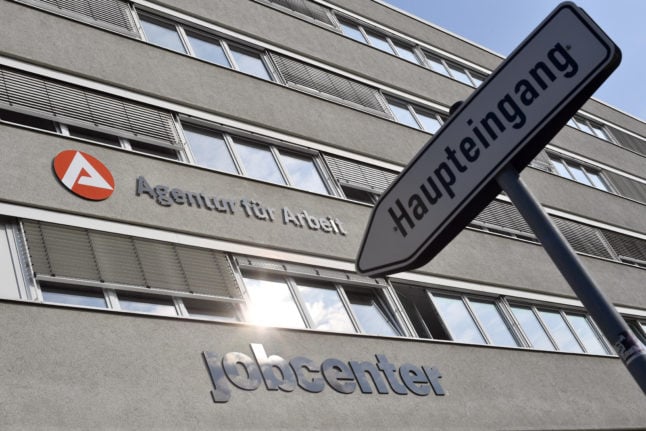EXPLAINED: Germany's plans to ditch sanctions for the unemployed

In the first step towards reforming unemployment benefits, the German government has voted to get rid of the controversial sanctions for Hartz IV claimants from July. Here's what you need to know.
What going on?
From July onwards, people receiving Hartz IV - Germany's notorious unemployment benefit - will no longer have to worry about hefty sanctions on their benefits payments.
In an amendment to the Social Code that was voted through by the Bundesrat on Friday, the government agreed to place a year-long pause on almost all types of sanctions for the unemployed.
The move is likely to be welcomed by the 3.5 million people who currently get Arbeitslosengeld II - the type of social security payment claimed by the long-term unemployed, which is otherwise known as Hartz IV.
It marks the first step in a bigger reform of the welfare system, which the government says will make it fairer for people who are forced to rely on state support.
What are sanctions?
Sanctions are closely bound up with the philosophy of Hartz IV, which links the right to receiving welfare payments to certain obligations, like actively looking for work and applying for jobs that the job centre recommends.
If a benefits claimant doesn't meet these obligations, they get punished - or sanctioned - with a cut to their welfare payments.

A sign directs visitors to the main entrance of the job centre in Weimar. Photo: picture alliance/dpa/dpa-Zentralbild | Jens Kalaene
Advocates of this system say it incentivises people to find a job more quickly and makes it harder for people who don't want to work to cheat the system. But critics say taking money away from people who may be struggling to make ends meet is inhumane and could leave people in dire financial straits.
READ ALSO: Wages, rent and pensions: What will the new German government mean for your wallet?
So what exactly has changed?
As we mentioned, if you want to get the full unemployment allowance every month, there are generally a significant number of hoops to jump through - and missing one of these, even by accident, can get you sanctioned.
In the long catalogue of potential offences, things like not keeping in touch with the job centre regularly enough, not informing officials if you go away on holiday, being late for an appointment or failing to apply for a job can all be met with fines of up to 30 percent of your benefits.
From July, all of that is set to change. Until at least July 2023, people who refuse to accept a job offer or don't apply for an appropriate role will no longer face sanctions.
The only sanction that will remain in place is the sanction for missing job centre appointments without a good reason. However, instead of being able to dock up to 30 percent of the claimant's €449 monthly allowance, the maximum reduction will be 10 percent.
READ ALSO: EXPLAINED: How the minimum wage will increase in Germany in 2022
What happens after July 2023?
From July next year, the government plans to get rid of Hartz IV completely, replacing it with a new type of unemployment benefit known as Bürgergeld (Citizens' Allowance).
It's unclear what exactly this will look like, but the main purpose of the rebrand is to rethink how obligations and sanctions should work for benefit claimants.
"The coalition agreement provides for the introduction of a so-called Citizen's Allowance," the government states on its website. "The Citizen's Allowance is intended to reorganise sanctions and obligations to cooperate. The sanctions moratorium is an interim step along the way."
With its new Citizens' Allowance, the traffic-light coalition of the Social Democrats (SDP), Greens and Free Democrats (FDP) is hoping to implement a court decision that was reached way back in 2019.
At the time, Germany's highest court - the Constitutional Court in Karlsruhe - ruled that cutting people's benefits by more 30 percent contradicted the Basic Law, which ultimately led to sanctions being capped at this rate.

A job advertisement board in the jobcentre in Nuremberg. Photo: picture alliance/dpa | Daniel Karmann
However, the Karlsruhe court also reached another important decision. Though the judges said it was fair to ask benefits claimants to fulfil certain duties, they also found that many of the sanctions being levied against people on welfare were disproportionate and unfair.
READ ALSO: Hartz IV: German court slaps down harshest sanctions against jobseekers
The goal of the Citizens' Allowance will be to reorganise the system to make it fairer to claimants, while also factoring in scientific evidence and practical experience from the Covid pandemic, when sanctions were also scrapped for a limited time.
The coalition says that sanctions of up to 30 percent will still be possible under the new system - though there will be exceptions in the case of hardship - and jobseekers will be required to sign an agreement that specifies their duties and obligations before receiving benefits.
What are people saying about this?
As you might expect, the right-wing CDU and CSU parties are not particularly thrilled about the planned changes, with the parliamentary group arguing that the change will destroy public trust in the welfare state.
"It is unacceptable to any employee or taxpayer that they should now finance the lives of those who are not even willing to look for a job," Wolfgang Steiger, the head of the CDU-backed German Economic Council, said in March.
READ ALSO: Germany to raise Hartz IV unemployment benefit by just three euros
Employees at the job centre are also believed to be up in arms about the perceived 'free pass' for people receiving €449 a month in unemployment benefit from the state.
"This is a disaster," one job counsellor told the Süddeutsche Zeitung. Suspending benefit cuts could allow Hartz IV recipients to "walk all over" employees in the job centre, she added.
However, experts vehemently disagree that the lack of sanctions will acts as a disincentive for people to look for work.

Empty chairs in the waiting area of the jobcentre in Nuremberg. Photo: picture alliance/dpa | Daniel Karmann
"Based on numerous research findings, it seems unlikely that unemployed people's interest in working will decrease significantly after sanctions are abolished," Prof. Dr. Karsten Paul, a specialist in work psychology, said in an interview with Focus Online.
There are numerous positive benefits to work that don't involve monetary compensation, including recognition, social contact, and a sense of purpose and usefulness in society, Paul explained.
"All of these positive effects of gainful employment suggest that work will remain attractive to the unemployed and that they will continue to seek it, even if they can no longer be threatened with the partial loss of their unemployment benefits if they 'misbehave'," he added.
Comments
See Also
What going on?
From July onwards, people receiving Hartz IV - Germany's notorious unemployment benefit - will no longer have to worry about hefty sanctions on their benefits payments.
In an amendment to the Social Code that was voted through by the Bundesrat on Friday, the government agreed to place a year-long pause on almost all types of sanctions for the unemployed.
The move is likely to be welcomed by the 3.5 million people who currently get Arbeitslosengeld II - the type of social security payment claimed by the long-term unemployed, which is otherwise known as Hartz IV.
It marks the first step in a bigger reform of the welfare system, which the government says will make it fairer for people who are forced to rely on state support.
What are sanctions?
Sanctions are closely bound up with the philosophy of Hartz IV, which links the right to receiving welfare payments to certain obligations, like actively looking for work and applying for jobs that the job centre recommends.
If a benefits claimant doesn't meet these obligations, they get punished - or sanctioned - with a cut to their welfare payments.

Advocates of this system say it incentivises people to find a job more quickly and makes it harder for people who don't want to work to cheat the system. But critics say taking money away from people who may be struggling to make ends meet is inhumane and could leave people in dire financial straits.
READ ALSO: Wages, rent and pensions: What will the new German government mean for your wallet?
So what exactly has changed?
As we mentioned, if you want to get the full unemployment allowance every month, there are generally a significant number of hoops to jump through - and missing one of these, even by accident, can get you sanctioned.
In the long catalogue of potential offences, things like not keeping in touch with the job centre regularly enough, not informing officials if you go away on holiday, being late for an appointment or failing to apply for a job can all be met with fines of up to 30 percent of your benefits.
From July, all of that is set to change. Until at least July 2023, people who refuse to accept a job offer or don't apply for an appropriate role will no longer face sanctions.
The only sanction that will remain in place is the sanction for missing job centre appointments without a good reason. However, instead of being able to dock up to 30 percent of the claimant's €449 monthly allowance, the maximum reduction will be 10 percent.
READ ALSO: EXPLAINED: How the minimum wage will increase in Germany in 2022
What happens after July 2023?
From July next year, the government plans to get rid of Hartz IV completely, replacing it with a new type of unemployment benefit known as Bürgergeld (Citizens' Allowance).
It's unclear what exactly this will look like, but the main purpose of the rebrand is to rethink how obligations and sanctions should work for benefit claimants.
"The coalition agreement provides for the introduction of a so-called Citizen's Allowance," the government states on its website. "The Citizen's Allowance is intended to reorganise sanctions and obligations to cooperate. The sanctions moratorium is an interim step along the way."
With its new Citizens' Allowance, the traffic-light coalition of the Social Democrats (SDP), Greens and Free Democrats (FDP) is hoping to implement a court decision that was reached way back in 2019.
At the time, Germany's highest court - the Constitutional Court in Karlsruhe - ruled that cutting people's benefits by more 30 percent contradicted the Basic Law, which ultimately led to sanctions being capped at this rate.

However, the Karlsruhe court also reached another important decision. Though the judges said it was fair to ask benefits claimants to fulfil certain duties, they also found that many of the sanctions being levied against people on welfare were disproportionate and unfair.
READ ALSO: Hartz IV: German court slaps down harshest sanctions against jobseekers
The goal of the Citizens' Allowance will be to reorganise the system to make it fairer to claimants, while also factoring in scientific evidence and practical experience from the Covid pandemic, when sanctions were also scrapped for a limited time.
The coalition says that sanctions of up to 30 percent will still be possible under the new system - though there will be exceptions in the case of hardship - and jobseekers will be required to sign an agreement that specifies their duties and obligations before receiving benefits.
What are people saying about this?
As you might expect, the right-wing CDU and CSU parties are not particularly thrilled about the planned changes, with the parliamentary group arguing that the change will destroy public trust in the welfare state.
"It is unacceptable to any employee or taxpayer that they should now finance the lives of those who are not even willing to look for a job," Wolfgang Steiger, the head of the CDU-backed German Economic Council, said in March.
READ ALSO: Germany to raise Hartz IV unemployment benefit by just three euros
Employees at the job centre are also believed to be up in arms about the perceived 'free pass' for people receiving €449 a month in unemployment benefit from the state.
"This is a disaster," one job counsellor told the Süddeutsche Zeitung. Suspending benefit cuts could allow Hartz IV recipients to "walk all over" employees in the job centre, she added.
However, experts vehemently disagree that the lack of sanctions will acts as a disincentive for people to look for work.

"Based on numerous research findings, it seems unlikely that unemployed people's interest in working will decrease significantly after sanctions are abolished," Prof. Dr. Karsten Paul, a specialist in work psychology, said in an interview with Focus Online.
There are numerous positive benefits to work that don't involve monetary compensation, including recognition, social contact, and a sense of purpose and usefulness in society, Paul explained.
"All of these positive effects of gainful employment suggest that work will remain attractive to the unemployed and that they will continue to seek it, even if they can no longer be threatened with the partial loss of their unemployment benefits if they 'misbehave'," he added.
Join the conversation in our comments section below. Share your own views and experience and if you have a question or suggestion for our journalists then email us at [email protected].
Please keep comments civil, constructive and on topic – and make sure to read our terms of use before getting involved.
Please log in here to leave a comment.